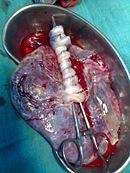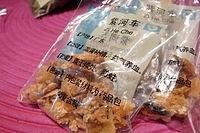PLACENTOPHAGY

Placentophagy (from 'placenta' + Greek φαγειν , to eat; also referred to as placentophagia) is the act of
mammals eating the placenta of their young after childbirth.
The placenta contains high levels of prostaglandin . Prostaglandin stimulates involution (an inward curvature or penetration, or, a shrinking or return to a former size) of the uterus. The placenta also contains small amounts of oxytocin which eases birth stress and causes the smooth muscles around the
mammary cells to contract and eject milk. There have been no studies of whether placentophagy provides hormonal effects in humans.
There is also a school of thought that holds that placentophagy naturally occurred to hide any trace of childbirth from predators in the wild. Many placental mammals participate in placentophagy, including
herbivores; exceptions include Pinnipedia , Cetacea,
camels and, in rare cases, humans . Placentophagy has been observed in Insectivora , Rodentia, Chiroptera ,
Lagomorpha , Carnivora , Perissodactyla, Artiodactyla (with the camel as a noted exception), and Primates.
Marsupials, which are an order of metatherian (pouched) mammals, resorb rather than deliver the placenta, and therefore cannot engage in placentophagia; they do, however, vigorously lick birth fluids as they are excreted.
Some research has shown that ingestion of the placenta can increase the pain threshold in pregnant rats. Rats that consumed the placenta experienced a modest amount of elevation of naturally occurring opioid-mediated analgesia. Endogenous opioids, such as endorphin and dynorphin, are natural chemicals, related to the opium molecule, that are produced in the central nervous system. Production of these endogenous opioids is increased during the birthing process. They have the ability to raise the threshold of pain tolerance in the mother. When coupled with ingested placenta or amniotic fluid, the opioid effect on pain threshold is dramatically increased. Rats that were given meat instead of the placenta showed no increase in the pain threshold. There are no studies that show any benefits of placenta ingestions in humans. There have been no scientific studies which show that placentophagy enhances analgesia in humans.
Human placenta

Dried human placenta as medicine - Ziheche (紫河车)

Although the placenta is revered in many cultures, there is scarce evidence that any customarily eat the placenta after the newborn's birth.
Those who advocate placentophagy in humans believe that eating the placenta prevents postpartum depression and other pregnancy complications.
Obstetrician and spokesperson for the Royal College of Obstetricians and Gynaecologists Maggie Blott disputes the post-natal depression theory, stating there is no medical reason to eat the placenta; "Animals eat their placenta to get nutrition - but when people are already well-nourished, there is no benefit, there is no reason to do it." While no scientific study has proven any benefits, a survey was conducted by American Medical anthropologists at the University of South Florida and
University of Nevada, Las Vegas. Among the respondents, about 3/4 claimed to have positive experiences from eating their own placenta, citing "improved mood", "increased energy", and "improved lactation".
Human placenta has also been an ingredient in some
traditional Chinese medicines , including using dried human placenta, known as "Ziheche" ( simplified Chinese :
紫河车 ; traditional Chinese : 紫河車; pinyin : Zǐhéchē ), to treat wasting diseases, infertility, impotence and other conditions. Most recently, the CDC published a report of a newborn infected with Group B Streptococcus (GBS) bacteria likely after the mother ingested placenta capsules. Consequently, the CDC said that placenta capsule ingestion should be avoided and to educate mothers interested in placenta encapsulation about the potential risks
British celebrity chef Hugh Fearnly-Whittingstall , known for his series of River Cottage programmes, notoriously cooked and ate a woman's placenta on one of his programmes.
Hi! I am a robot. I just upvoted you! I found similar content that readers might be interested in:
https://en.wikipedia.org/wiki/Placentophagy